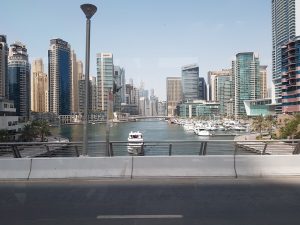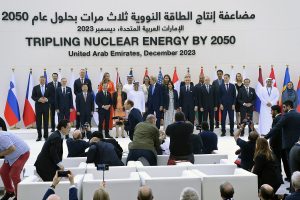COP28 refers to the 28th Conference of the Parties to the United Nations Framework Convention on Climate Change. It marks a continuation of the global commitment to develop a united plan against climate change. The conferences are utilised to create political consensus and develop progress towards implementing the Paris Agreement.
From the 30th of November 2023 to the 13th of December 2023, COP28 was held in Dubai. With more than 150 Heads of State and 85,000 participants, COP28 has been cited as the largest conference in COP history. The attendance figures are more than double the attendance figure at COP27, making this conference unprecedented in terms of scale.
Why was COP28 held in Dubai?
Dubai Marina / Image: Ravi Dwivedi (distributed via CC BY-SA 4.0)
The decision to host COP28 in an oil-exporting country such as the UAE has been met with criticism. On average, the UAE produces 3.2 million barrels of petroleum and liquids per day, making it one of the top 10 oil producers in the world.
Sultan Al Jaber / Image: Arctic Circle (distributed via CC BY 2.0)
Controversially, Sultan Al Jaber was also appointed as the president of the conference. As the head of UAE’s state-owned Abu Dhabi National Oil Company (ADNOC), his suitability for the role was questioned. Al Gore, former vice-president of the US, slammed the appointment as an abuse of public trust. Gore argues that ADNOC has been “one of the largest and least responsible oil companies”, creating an inherent conflict of interest. Not only did ADNOC pump out 2.7m barrels of oil in 2021, but the company also plans to double this figure by 2027. The criticisms of UAE hosting COP28 have been centred on its contradictory attitudes in facilitating a green transition in the face of oil and gas interests.
The UN’s response:
The United Nations notes that:
“Since its inception in 1971, the UAE has supported the global climate agenda. Situated in a region where heat is extreme and water is precious, the UAE has long viewed climate change as a challenge that must be overcome.”
The UN has highlighted the regional and geo-political advantage of the UAE – the strategic decision to host COP28 in the Middle East region highlights the need to further engage with Middle Eastern countries that are adversely affected by climate change.
Furthermore, the UN also perceives the UAE as a “regional leader in the energy and sustainability sectors”. In holding the conference in the UAE, the UN recognises its political influence and past achievements in leading sustainability initiatives.
Key Agreements:
Net Zero Nuclear event at COP28 / Image: Dean Calma (distributed via CC BY 2.0)
8 years after the Paris Agreement, COP28 marked a crucial moment to evaluate climate progress and establish key global commitments collectively. COP28 achieved several historical breakthroughs in multilateral agreements:
Transition away from Fossil Fuels
The final decision text explicitly commits to “transition away from fossil fuels in energy systems, in a just, orderly and equitable manner”. This is the first time that fossil fuels have been directly mentioned in the COP decision texts, therefore officially acknowledging the role of fossil fuels in driving climate change.
Loss and Damage Fund
The parties reached an agreement on the operationalisation of the loss and damage fund, along with its funding arrangements. First agreed to in the Egypt COP27, the wealthier countries who are historic contributors to the global warming crisis have pledged $700 million to the fund. By providing monetary support, the fund intends to aid vulnerable, developing countries suffering from the negative impacts of climate change. Countries pledging to support the fund include Italy, France and the UAE.
Reduction of Methane Emissions
Over 150 countries have signed the Global Methane Pledge, which promises to reduce methane emissions by 30% before 2030. With $1 billion in grant funding, COP28 marked a major move towards reducing methane emissions.
Aside from the multilateral agreements, producers and businesses have cooperated to drastically decrease methane emissions. Roughly 50 oil and natural gas producers have committed to suppressing methane emissions to near-zero by 2030.
The US government has also pledged to require fossil fuel companies to detect and fix methane leaks that waft from their production facilities. This legislation will prevent 1.5 billion metric tons of greenhouse gas emissions.
Expanding Renewable Energy Capacity
The world’s first Global Stocktake report additionally proposed to triple renewable energy capacity by 2030. Countries have also pledged to triple the deployment of renewable energy sources and double the rate of energy efficiency improvement by 2030.
Nature Protection Financing
To advocate for nature-based solutions to climate change, $186.6 million of nature and climate financing was announced to support forests, mangroves, and the ocean. Moreover, a significant breakthrough was achieved by multilateral banks who committed US$100 billion by 2027 and pledged to work closely in nature-positive finance initiatives.
Does COP28 go far enough in achieving a green transition?
Climate Action Network, pictured in 2020 / Image: Mickeyeva (distributed via CC BY-SA 4.0)
Whilst COP28 has been momentous in unveiling major climate action commitments, NGOs and think tanks have argued that the key agreements are too little and too late.
Harjeet Singh, who is the head of global political strategy at Climate Action Network International, has argued that the loss and damage fund is largely insufficient. The pledge of $700 million pales “in comparison to the colossal need for funding, estimated in the hundreds of billions annually”. Furthermore, Singh criticizes the 30-year delay in establishing the fund – there is already irreversible long-term environmental damage for developing nations.
The final decision text also refers to employing ‘transitional fuels’ to facilitate the transition towards low-carbon technologies. This is broadly interpreted as natural gas, along with Carbon Capture, Utilisation and Storage (CCUS). However, the wording and language highlight the role of fossil fuel interests within the COP28 negotiations. As a fossil fuel, natural gas produces higher levels of methane emissions than previously estimated. The incorporation of natural gas as a transitional bridge may contravene COP28 commitments to cut methane emissions.
The Future of a Green Transition
Overall, the pivotal climate consensus reached at COP28 has been heralded as the “beginning of the end” of the fossil fuel era. With landmark decisions and the expansions of climate-friendly financing, COP28 has expanded the global capacity to transition away from non-renewable energy. However, 2023 was a year of climate catastrophes, natural disasters and temperature abnormalities. The world will require the political consensus shown at COP28 to create a green transition and prevent the emerging signs of a climate crisis.
by Ying Zeng
Cover Image Source: Dubai Foto Oficial COP28 by Fotografía oficial de la Presidencia de Colombia via Wikimedia commons










